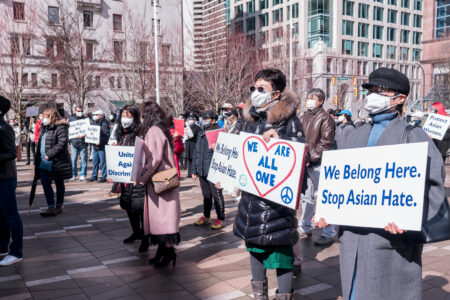
Canadians continue to look to governments for policy responses that reflect the world we live in. This includes an expectation that governments will take a leadership role in addressing racial discrimination, equity and human rights in our society. For their part, Canadian governments are increasingly speaking of anti-racist policy approaches, ever aware that while transformational social and economic changes are well underway, there are still significant issues of racism and racial discrimination in our policy-making systems.
A substantial gap exists in policy literature and practice about what anti-racist policy analysis actually looks like. People who engage in it – professionally inside and outside government, as well as on a more informal basis – should be able to draw on accessible frameworks that can be applied quickly and effectively.
Anti-racist policy analysis is a crucial part of elevating Canadian policy-making. Continuing to ignore the long-standing effects of colonialism and ideas of racial hierarchy perpetuates racial discrimination, even when it is not intentional. Ideas of racial hierarchy that underpin the racialization of some groups are institutionalized in Canadian policy systems and are still finding their way into the fundamentals of policy processes. These underlying dynamics, which are at times brought to light, are undermining our collective well-being, including the effectiveness of Canadian policy-making.
Anti-racist policy analysis illuminates gaps in decision-making
Consider the federal government’s announcement in October that it would end the Canada Recovery Benefit (CRB), successor to the Canada Emergency Response Benefit (CERB). Its comments that the economy has recovered 100 per cent of the jobs lost during the pandemic represented a perspective that discounts the experiences of communities that continue to be marginalized by Canadian public policy.
It was also a key opportunity to use anti-racism policy analysis to present a fuller picture of the dynamics involved in pandemic and post-pandemic income-support policy. This analysis would have clearly shown the importance of transitioning temporary supports into longer-term policy solutions that respond to the potentially significant economic effects of the pandemic that can disproportionately affect groups that are racialized. This was the time policy leaders could have acted on promises of inclusion and equity they often speak of.
Taking an anti-racist approach would have, for example, highlighted the fact that several groups that are racialized, including Canadians who identify as Black, were still experiencing higher levels of unemployment as of September 2021 compared with groups that are not racialized.
If Black lives matter, it’s time for true policy action and accountability
Systemic racism endures as Quebec fails to reckon with slavery history
Statistics Canada has reported that people who are categorized as “visible minorities” (note that the use of this term is being reviewed for Canadian data collection and employment equity purposes) in Canada were harder hit than others by the social, economic and health impacts of the pandemic and were more likely to have received CERB. Specifically, workers who identified as West Asian (50.8 per cent), Southeast Asian (48.3 per cent), Arab (45.4 per cent), Korean (43.3 per cent), Black (43 per cent), and Latin American (41.8 per cent) were more likely to have received CERB payments, compared with 32 per cent of those who were not categorized as “visible minorities.” It was also reported that Indigenous workers were more likely than non-Indigenous workers to have received CERB payments in 2020.
These findings highlight the unavoidable racial dynamics involved in income-support policy-making. We know that groups that are racialized, particularly African-Canadian communities, disproportionately experience lower incomes, food insecurity, precarious or inadequate housing, and challenging employment outcomes.
In a clear demonstration of the impact of racialization, a recent publication based on 2005-14 data from the Canadian Community Health Survey (CCHS) found that being racialized as Black is a major factor shaping food insecurity for people of African descent in Canada. Using 2017-18 data from the CCHS, a national analysis of food insecurity also found that the highest rates in Canada were among households that identified as Black, at 28.9 per cent, and those that identified as Indigenous, at 28.2 per cent.
We know these policy outcomes stem from centuries of racialization and racial discrimination that have become institutionalized in Canadian policy systems – these policy systems have routinely prioritized the interests and well-being of groups placed at the top of racial hierarchies, while minimizing the interests and well-being of groups that are racialized. Anti-racism policy analysis is crucial to illuminating and eradicating the effects of racialization in policy processes and systems.
Policy analysts, leaders and observers can help to enhance policy processes and improve outcomes with tools like the Anti-Racism Policy Analysis Framework that I have developed. As a guide for policy analysis, this framework takes a human-rights-driven approach to identifying specific areas where racism and racial discrimination often lurk in policy processes. Anti-racist frameworks that support elevated policy-making are essential parts of the toolkit for all individuals, groups and organizations that participate in policy systems.
Anti-racist policy analysis supports core Canadian values
Governments must accept that while their policy designers and decision-makers may not intend to perpetuate racial discrimination, a failure to respond to racism in policy systems leads to the exclusion of groups that are racialized. This is not just counter to our collective values of inclusion and equity, it also affects Canadians’ trust and confidence in the political competencies of Canadian governments.
Demonstrating anti-racism policy leadership in government requires prioritizing the elimination of racial discrimination from the earliest stages of agenda-setting and when allocating resources to policy initiatives.
Governments should openly recognize the impact of institutionalized racial discrimination, and take meaningful action to repair and rebuild relationships with affected groups. This can include statements in policy announcements acknowledging that Canadian policy legacies have led to deep disparities in socioeconomic outcomes, and affirming that healing these disparities requires focused, intentional anti-racist policy action.
Moving toward effective anti-racist policy-making also requires governments to take strategic approaches to policy development, such as tying policy initiatives to broader government objectives around equity and co-ordinating anti-racist policy approaches with other orders of government. Additionally, governments are asked to meaningfully engage groups that are racialized throughout policy design and implementation processes.
Accountability and transparency are core aspects of anti-racist policy-making. Governments are asked to ensure that there is open access to information that goes into policy decision-making, and that people have tools outside of elections to hold policy-makers accountable for decisions that have a significant impact on their well-being.
Envisioning Canadian public policy of the future
Anti-racist policy analysis is not only about identifying obvious instances of racial discrimination in public policy. Rather, it is most relevant in our society as a tool that shines a light on deeply entrenched policy legacies, conventions and traditions that marginalize and ignore the priorities and well-being of groups that are racialized.
Policy responses in the near future will increasingly require a high level of capacity to apply and operationalize analytical frameworks that help to eliminate racism and racial discrimination in government decision-making. Policy analysts and community members who engage in policy processes should be able to draw on accessible frameworks that can be applied quickly and effectively. Instead of addressing issues of institutionalized racism on an ad-hoc basis, policy analysts and leaders should be equipped with the tools to enable high quality, dynamic analysis through all stages of policy processes, from agenda-setting and policy formulation to policy implementation and evaluation.
Anti-racist policy analysis is also a part of how Canadian governments can work to earn the trust of groups and communities that have experienced centuries of discrimination at the hands of policy systems. Treating people with respect and love that honours their humanity is at the core of anti-racism, and that is a worthwhile priority for all Canadian governments.










